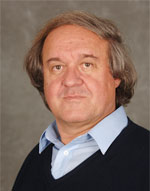 Josef P. Rauschecker, PhD., is a Professor in the Department of Physiology and Biophysics. Dr. Rauschecker is interested in the functional organization and plasticity of the cerebral cortex. Through his extensive research, he is trying to gain a better understanding of how the brain works and is especially interested in how perception, memory, and language are implemented by the brain. His laboratory is one of only a handful in the country engaged in the neurophysiology of auditory cortex in nonhuman primates. In a parallel study, he is using functional magnetic resonance imaging (fMRI) in humans for the study of the neural basis of language, music and other higher auditory processing. This work should lead to a deeper understanding of brain function in autism, dyslexia, asphasia, agnosia and tinnitus, and more intelligently designed hearing aids and neural prostheses. In this context his laboratory is also interested in the effects of sensory deprivation during brain development, relating to the question of how the brains of individuals with early blindness or deafness get reorganized. These studies of brain plasticity have relevance for the understanding of degenerative diseases of the brain, such as Alzheimer's disease. Josef P. Rauschecker, PhD., is a Professor in the Department of Physiology and Biophysics. Dr. Rauschecker is interested in the functional organization and plasticity of the cerebral cortex. Through his extensive research, he is trying to gain a better understanding of how the brain works and is especially interested in how perception, memory, and language are implemented by the brain. His laboratory is one of only a handful in the country engaged in the neurophysiology of auditory cortex in nonhuman primates. In a parallel study, he is using functional magnetic resonance imaging (fMRI) in humans for the study of the neural basis of language, music and other higher auditory processing. This work should lead to a deeper understanding of brain function in autism, dyslexia, asphasia, agnosia and tinnitus, and more intelligently designed hearing aids and neural prostheses. In this context his laboratory is also interested in the effects of sensory deprivation during brain development, relating to the question of how the brains of individuals with early blindness or deafness get reorganized. These studies of brain plasticity have relevance for the understanding of degenerative diseases of the brain, such as Alzheimer's disease.
|

